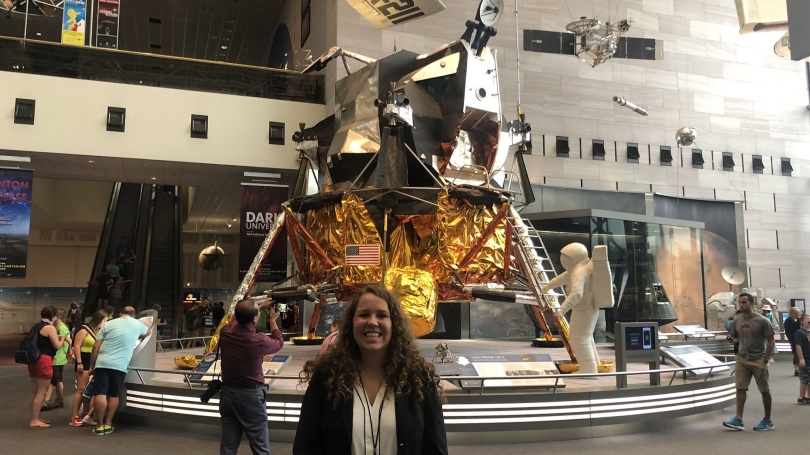
- Public Policy
- Leadership
- Funding
- News & Events
- About the Center
Back to Top Nav
Back to Top Nav
Back to Top Nav
Back to Top Nav
Tyler Work '20 interned at the Smithsonian Organization and Audience Research (SOAR) during the 2019 summer term. The following is an excerpt from her internship report.
This past summer, I interned at The Smithsonian Organization and Audience Research (SOAR) of the Smithsonian Institution. Their work focuses on helping Smithsonian units operate more effectively and engage with their audiences to the best of their ability. The organization balances research, data-driven analysis, and strategic thinking to help the Smithsonian achieve its goals. At SOAR, I worked on a diverse range of projects with a variety of Smithsonian units, including but not limited to the National Air and Space Museum (NASM), the National Museum of Natural History (NMNH), and the Smithsonian Center for Learning and Digital Access (SCLDA). Through these projects I was able to engage with every step of the analysis process: initial data collection through surveys or interviews, qualitative analysis with Excel or SPSS, quantitative analysis of interview transcripts and written open responses, and report writing.
My two major projects focused on NASM’s online collection and a teacher-education program through SCLDA. Working on NASM’s online collection, I used cross-tabulation analysis to better understand current digital users’ perception of the online collection and how the museum can both better serve its current audience and expand its scope to new people. The project with SCLDA offered the unique challenge of a limited quantitative data set and a put greater emphasis on case study examples from qualitative interview responses. Overall, my experience with these and other projects allowed me to further my ability to engage with museum visitors, analyze large sets of data, and effectively present information through figures and written documents. The SOAR community was incredibly supportive in teaching me new techniques, answering questions, and giving me the flexibility to join projects that interested me.
I also felt comfortable reaching out to anyone at the office with questions. The internship gave me the flexibility to choose projects that I was interested in and practice skills I wanted to enhance. When I wanted to use another program to process survey responses for a project on the Asian American Literature Festival, my project manager took the time to teach me how to use the program and often stopped by to offer new tricks that would make my analysis more efficient and effective.
Thus, my internship experience reminded me why I decided to be a Math Major showed me how I can find a career that meets both my interest in applied mathematics and personalized connections. Using both quantitative and qualitative analysis allows you to better understand the big picture while using specific examples and personal anecdotes to humanize the audience being studied. I am excited to continue studying these skills at Dartmouth. Moreover, I want to thank the Rockefeller Center for all the support it has given to me. Participating in in Dartmouth Leadership Attitudes & Behaviors (D-LAB) and working with the Policy Research Shop helped prepare me for this amazing experience. Without funding from the Rockefeller Center, I would have never been able to pursue this amazing opportunity.
The Rockefeller Internships Program has funding for Dartmouth undergraduate students to help defray the cost of living expenses associated with a full-time, unpaid, leave-term internships in the fields of public policy, public affairs, and social entrepreneurship.